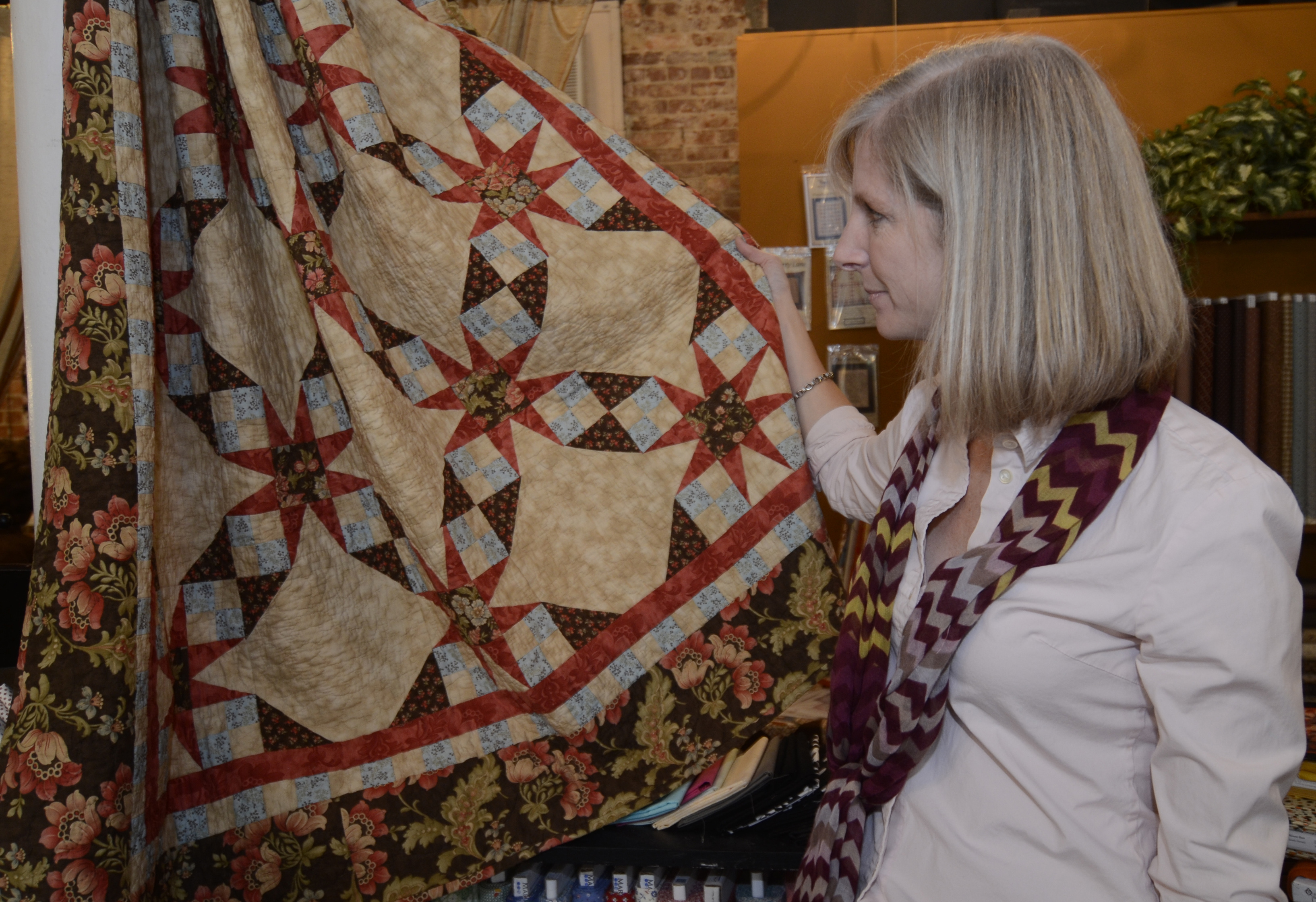AREA QUILT SHOWSTODAY: "Common Threads," 8 a.m.-4 p.m., Mount Olive Church of God family center, 3533 Harrison Pike, Cleveland, Tenn. $3 (includes quilt drawing). 423-472-7523 or 715-4033.OCT. 19-20: "Every Quilt Has a Story," Hixson chapter of the Order of the Eastern Star, 10 a.m.-5 p.m. both days, Oakwood Baptist Church, 4501 Bonny Oaks Drive. $5. 842-9325.
TO GET STARTEDClass schedules are available by calling 648-2842 or visiting http://chattanoogaquilts.com.
Wrapping up in Grandma's handmade quilt offers the ultimate feeling of warmth and comfort.
And using them is exactly what people should do with quilts, said Kim Thomas, owner of Chattanooga Quilts on Main Street in Ooltewah.
"Enjoy your quilts," she said. "They don't do anybody any good being stored."
Thomas said people tend to store treasured handmade quilts in plastic containers and vacuum-sealed bags. "These methods actually help to deteriorate a quilt because it traps the moisture," she said, "Fabric also deteriorates over time."
Instead, if they must be stored, quilts should be placed in cotton pillowcases or wrapped in cotton sheets. They can be machine-washed on a gentle cycle using Vintage Textile Soak (available online and in specialty stores).
Thomas said she overheard a quilting teacher tell someone that these reminders of the past should be enjoyed in the present.
"After you're gone, your quilt will be traveling down I-75 on the back of a truck wrapped around a refrigerator," the teacher said. "So use it now."
The method of constructing a quilt by hand has changed so dramatically in recent years, Thomas said, "it's almost a dying art." Instead of taking months to painstakingly sew every stitch by hand, many quilters now expedite the process with sewing machines.
"It takes me about two weeks to make a quilt," she said. "I don't even use scissors anymore. I use rotary cutters (resembling a pizza cutter) instead. With rotary scissors, a quilting ruler (about $24) and a rotary cutting map ($30), I can get all the quilt pieces cut out in two hours."
Thomas, 43, said although quilting has traditionally had a strong local following, many more women are taking an interest.
"Sewing arts are very trendy now. Young mothers are sewing more than ever. That's why fabric makers are doing new lines," she said.
Thomas' business has a similar vintage appeal. Chattanooga Quilts is housed in a building constructed in the 1930s that was long occupied by a pharmacy. The dark hardwood floor, counter and built-in shelves are original, she said. It's a one-stop shop for quilting needs, with dozens of bolts of cotton, thread, patterns, notions and other supplies.
The fabrics are "quilt quality," she said, meaning that extra finishing processes will set the dyes to prevent or minimize bleeding. Premium fabrics cost more, she said, typically $9.99 a yard.
Thomas said she made her first quilt six years ago while in a coffee group with five other stay-at-home moms.
"One of the moms is an accomplished quilter, and she wanted to teach us," she said. "I did not sew -- at all. I never constructed a piece of clothing, and my mother didn't sew."
She did, though, love handmade quilts.
"I was jealous of families that had quilts that had been passed down," she said.
The group of moms learned to sew, and within weeks, Thomas not only made her first quilt but developed a love of fabric, quilting and quilting shops.
At the time, there were two quilting shops in Chattanooga, and one soon went out of business, Thomas said. "I knew the local quilting community was underserved," she said. "I mentioned to my husband that I would like to open a quilt shop."
Thomas considers herself a traditional quilter, favoring vintage American patterns. Her favorite is Tennessee Waltz, which uses two blocks to create the illusion of curves.
"We have a lot of patterns including reproductions of Civil War and French country patterns," she said. "As soon as you make the quilt, it looks old."
Her shop offers classes for all experience levels.
"We start a new four-week class every month," she said. "At the end of the month, you will have finished a quilt."
